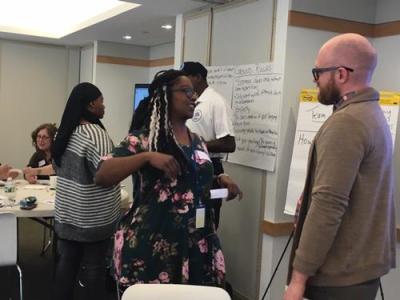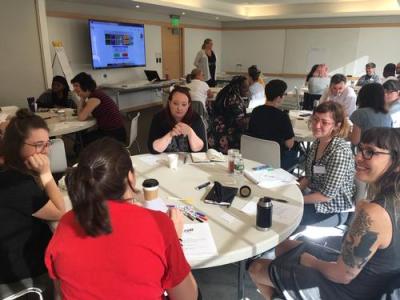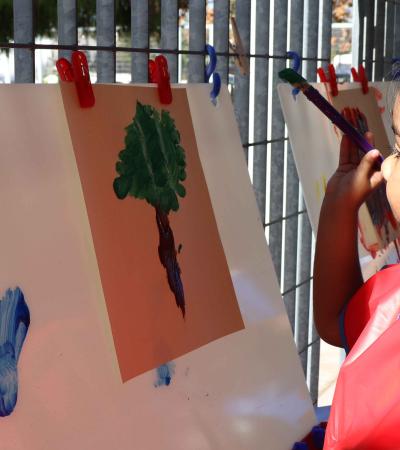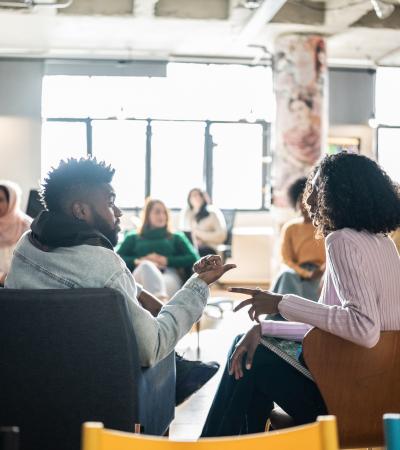The Skills for Community-Centered Libraries initiative — a series of trainings meant to build community engagement capacities among staff — launched on Oct. 2, so it’s a good time for the Free Library of Philadelphia’s community organizing team to share what exactly we mean by community engagement. A common definition is a baseline for discussion at workshops and a way to push people’s thinking.

We reached out to our National Advisory Committee members to learn how their library systems define engagement and outreach and how they build library staff capacity.
Cindy Fesemyer, director of the Columbus Wisconsin Public Library, makes a distinction between engagement and outreach based on whose goals the work is advancing: “Community outreach is doing what you do in order to fulfill or advance aspecific goal of the library. Community engagement is doing what you do in order to fulfill or advance a specific goal of the community.”
Cindy recommended a Building the Field of Community Engagement publication called “Distinguish Your Work” that helped us reflect on our work and formulate our own definitions. Engagement and outreach activities build upon each other, so our definitions and examples are distinctly different, yet not mutually exclusive.
- Community Outreach: Building awareness and sharing information about programs, resources, and services with people in a community. Examples: door-knocking, tabling at community events, fliering, phone-banking, and doing presentations about the library’s resources.
- Community Engagement: Building relationships between staff and surrounding communities to empower people to take ownership of their library and its resources. Engagement is an active partnership that serves the interest of local communities and the public good. Examples: getting community members involved in the planning and execution of programming, facilitating conversations in which people can envision what they want out of their library, and including community members as experts in their own neighborhoods and needs.
- Capacity Building: Supporting the development of skills and resources that enable an individual, organization, or community to achieve their goals more effectively and efficiently, so they can take on new, greater, or more complicated endeavors. Examples: providing civic education workshops for the community, offering facilitation and communication training for staff, developing fundraising training for Friends groups, helping Friends groups plan a meeting, and supporting staff in planning their own meetings.

A primary goal of our organizing team is to build the capacity of both community and staff, but that is never where a relationship starts. Sara Gillis, Community Engagement Manager at Halifax Public Libraries, echoed this relationship: “We see outreach activities as useful tools in ‘entering’ a community and getting to know them. Then, you can build on this initial relationship to build responsive services by more engagement and collaboration with that community.”
The Skills for Community-Centered Libraries trainings are focusing on increasing staff capacity to do community engagement, since many have been doing very successful outreach for a long time. From what we have learned from Katie O'Dell, director of programming and outreach, it sounds like Multnomah County Library has a similar expertise in outreach.
Katie explained: "We know community engagement is about giving voice to our public in the development of programs, policies, services and more. And we know that outreach has many, many iterations, but is often focused on creating awareness and bringing services to our community outside of our library buildings. While it's easy to see that community engagement and outreach greatly overlap, at Multnomah County Library, we haven't yet created clear, formalized paths or tools for staff to incorporate community engagement via their outreach work into a regular practice. We are currently working on an Library Services and Technology Act grant to prioritize and evaluate equitable library outreach while at the same time thinking through how to include community engagement as a natural, on-going element of that work.”
Both here in Philadelphia and at our advisors’ libraries, the Skills for Community-Centered Libraries trainings will support staff in developing their community engagement skills and practices. Future blog posts will feature their work and reflections.
For more information about the Skills for Community-Centered Libraries Initiative, contact Project Coordinator Cameron Voss at vossc@freelibrary.org.


